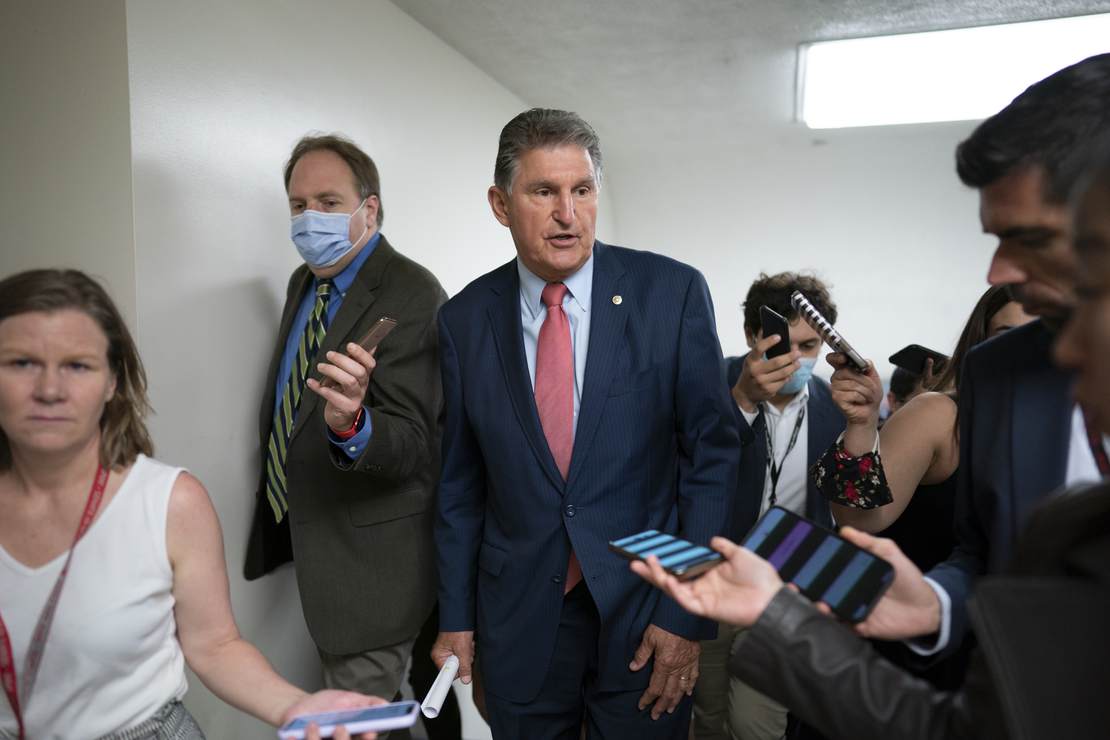
This would be a heavy lift in an election year, with the midterms just five months away.
But with a number of Senate Republicans retiring and many more not up for reelection until 2024 or 2026, it’s conceivable that Democrats could scrape 10 together. In fact, one of the few Republicans who’s on the ballot in November and facing a tough race might be incentivized to vote yes because of the quirks of her election. That would be Lisa Murkowski, who’ll need major help from Dems in Alaska to overcome a Trump-backed challenger from the right under the state’s new ranked-choice voting system.
Manchin says they’re going to huddle:
.@Sen_JoeManchin tells me a bipartisan group is gathering on the floor tonight to talk about possibilities for bipartisan gun control legislation. Manchin is lead sponsor of bill to expand background checks. He was talking to Portman earlier. Romney also interested in his bill.
— Trish Turner (@caphilltrish) May 25, 2022
There are two options here realistically and a new assault-weapons ban isn’t one of them. Mitt Romney has already ruled that out, calling it an issue for the states, and it’s hard to imagine any coalition of 10 Republicans for tightening gun laws not including Romney. The lowest-hanging fruit would be passing universal background checks, an issue that draws around 90 percent support among the public and has been kicked around in Congress for years. Romney’s open to that one:
Romney open to background check expansion (Manchin-Toomey)- “Improving our background check capability makes sense,” Romney says. “At this stage, it looks attractive, and I support the effort that it describes. But I have to look at the particulars. I haven’t read the bill yet…
— Trish Turner (@caphilltrish) May 25, 2022
Manchin and Pat Toomey famously co-sponsored a bill in 2013 that would have expanded background checks to gun shows and Internet sales but not to private sales between friends and family. The universal background checks bill passed by the House would include those private sales as well, which makes Manchin skittish, so the Manchin/Toomey bill may be the only version with a shot at 60 votes. Will passing it stop any mass shootings? Almost certainly not, but at this point I think moderate Dems and Republicans might be willing to pass token legislation just to show that both parties are willing to do *something* after the umpteenth horrific massacre. “Do something” is a terrible justification for lawmaking, especially at the federal level, but 90 percent public approval for the idea will tempt them.
The second option is red-flag laws, which I mentioned in an earlier post. That one really might stop some mass shootings. And Republicans are interested:
The House could come back, pass a red flag bill and send it to the Senate
A few GOP senators have been open to having conversations abt red flag laws: Graham, Collins, Romney, Blunt, Rick Scott, Portman, Braun, Cramer
Close to 10. But a conversation & a vote are very different https://t.co/DBauxtKrLK
— Natalie Andrews (@nataliewsj) May 25, 2022
Senate Rs on red flag laws today:
Blunt: ‘red flag…has the most potential’
Romney: ‘red flag laws make a lot of sense’
Collins: ‘interested’
Good thing there’s already a bill that’s had bipartisan support that they can sign on to! https://t.co/Wwyyg0L2HV
— Ian Mariani (@ian_mariani) May 25, 2022
READ RELATED: Report confirms White House had advance knowledge of the NSBA's 'domestic terrorism' letter and promised 'we have your back'
Susan Collins told reporters that she’s discussed her home state of Maine’s “yellow-flag” law with Democrat Chris Murphy, one of the most ardent gun-grabbers in Congress. The yellow-flag law allows law enforcement to petition a court to deny a dangerous person access to guns on the advice of a medical professional. “I think it’s the kind of law that could have made a difference in this case since according to press reports if they were accurate it appeared he suffered from mental illness,” Collins told Bloomberg. “It’s my understanding he bought his weapon legally and passed a background check. So I really think our focus should be on looking at what some states have done on red-flag or yellow-flag laws.”
But there’s a problem — or two problems, actually. One is that there probably aren’t 10 Senate Republicans willing to support a federal red-flag law. Again, Romney is out:
ROMNEY tells me he’s for background checks and thinks it’s an appropriate federal response, but would like red-flag laws administered at a state level.
— Jake Sherman (@JakeSherman) May 25, 2022
The other comes from attorney Gabe Malor, who asks people to consider the administrative clusterf*** it would cause in federal district courts if they suddenly had to issue rapid rulings on red-flag petitions (ERPOs). Romney’s right, says Malor. There’s a better forum available:
This is not something, generally, that the district courts have the resources or capacity to handle.
Makes much more sense to have ERPOs handled at the state level, which already has experience with immediate-action ex parte petitions in the intimate partner violence area.
— Gabriel Malor (@gabrielmalor) May 25, 2022
And another wrinkle: McBath’s bill says the petition must be filed with “an appropriate district court” but never says what “appropriate” means.
The district in which the gun owner lives? The petitioner? Whichever court’s closest?
— Gabriel Malor (@gabrielmalor) May 25, 2022
Beyond that, any successful red-flag scheme will require friends or family to intervene proactively to deny a loved one access to guns. And that won’t always happen:
For example, the guy who shot up a Waffle House had already had his guns confiscated once on account of his mental health challenges, and his father just gave them back, including the gun used in the shooting.
(The father has been sentenced to prison, btw.)
— Gabriel Malor (@gabrielmalor) May 25, 2022
For all of those reasons, as well as the election-year politics involved here, it’s unlikely that they’ll find 60 votes for a federal red-flag law. They might get closer to 60 for a law that would award federal funds to states to help them set up their own red-flag adjudicative programs — presumably Romney would be open to that one — but is money really the reason why only one red state, Florida, currently has a red-flag law? The objection is ideological, not pecuniary. Gun-rights advocates believe any form of new regulation is a step on the most slippery of legal slopes. Today a red-flag law, tomorrow a national gun registry.
Maybe Congress will end up passing something to expand federal funding for state mental-health programs more generally. That won’t stop (m)any shootings either, but the political imperative to Do Something here is immense. Almost as bad as the sense of horror after each massacre is the feeling of total civic paralysis in addressing a recurring problem which literally everyone agrees is abominable.
Here’s CNN cornering Marco Rubio in the Capitol today. Rubio is on the ballot five months from now in Florida and needs strong Republican turnout to prevail. He almost certainly won’t be voting for whatever Manchin’s crew eventually brings to the floor.
Asked Rubio why not ban AR-15s, and he said: “The truth of the matter is these people are going to commit these horrifying crimes, whether they have to use another weapon to do it, they’re going to figure out a way to do it.” Also contends more background checks won’t fix problem pic.twitter.com/crfprWZSyQ
— Manu Raju (@mkraju) May 25, 2022
Source:





